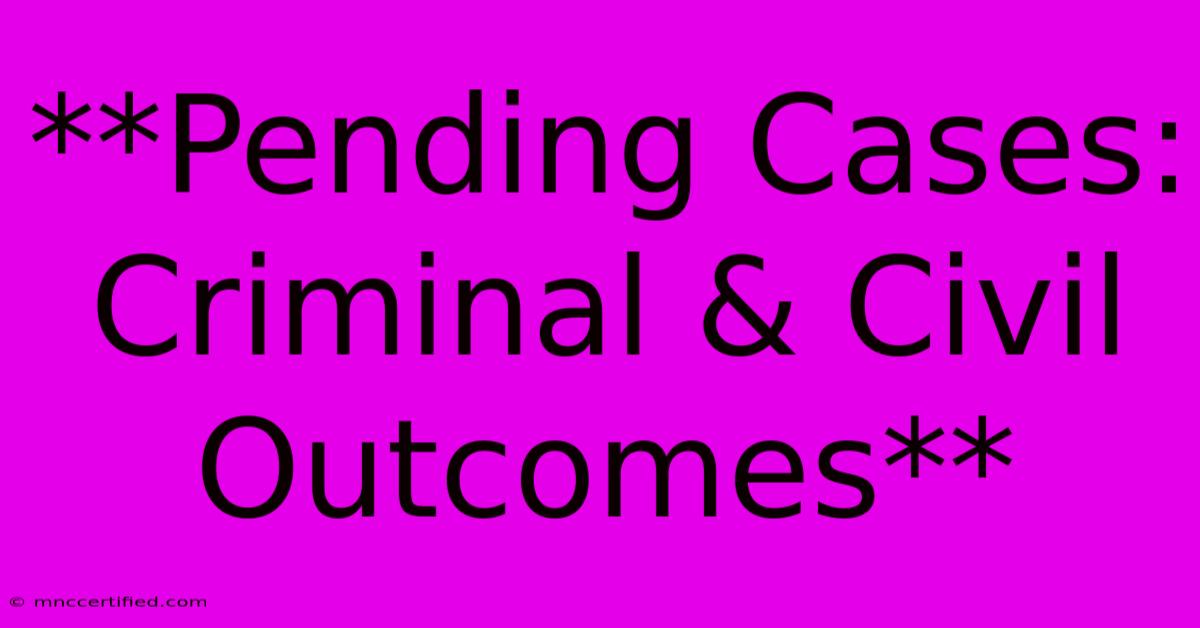**Pending Cases: Criminal & Civil Outcomes**

Table of Contents
Pending Cases: Understanding Criminal & Civil Outcomes
Navigating the legal system can be a confusing and stressful experience, especially when dealing with pending cases. Whether it's a criminal charge or a civil dispute, the uncertainty of the outcome can weigh heavily on individuals. Understanding the potential outcomes of pending cases, both in criminal and civil law, is crucial for navigating this process with a clear head.
Criminal Cases: A Range of Possible Outcomes
Criminal cases involve allegations of wrongdoing against the state or society. The potential outcomes in a criminal case vary greatly depending on the severity of the crime, the evidence presented, and the jurisdiction. Here are some common outcomes:
1. Dismissal: In some cases, charges may be dismissed due to insufficient evidence, prosecutorial discretion, or legal technicalities.
2. Plea Bargain: This involves the defendant agreeing to plead guilty to lesser charges or to a reduced sentence in exchange for dropping certain charges or avoiding a trial. This is a common outcome, as it avoids the time, cost, and uncertainty of a trial.
3. Trial: If a plea bargain is not reached, the case goes to trial. The outcome of a trial can result in:
- Acquittal: The defendant is found not guilty of the charges.
- Conviction: The defendant is found guilty of the charges and faces potential sentencing.
4. Sentencing: If convicted, a defendant will be sentenced by the court. This may involve:
- Probation: The defendant is released under supervision and subject to certain conditions.
- Jail Time: The defendant is sentenced to a period of imprisonment.
- Fines: The defendant is ordered to pay a monetary penalty.
- Community Service: The defendant is required to perform community service.
Civil Cases: Resolving Disputes & Seeking Remedies
Civil cases involve disputes between individuals, businesses, or organizations. The goal is to resolve the dispute and obtain a remedy for the wronged party. Common outcomes in civil cases include:
1. Settlement: Parties involved may reach an agreement outside of court, often with the help of mediation. This agreement can involve financial compensation, apologies, or other terms.
2. Trial: If a settlement is not reached, the case goes to trial. The outcome of a trial can result in:
- Judgment for the Plaintiff: The court finds in favor of the plaintiff, the party bringing the lawsuit, and orders the defendant to provide a remedy.
- Judgment for the Defendant: The court finds in favor of the defendant, dismissing the plaintiff's claims.
3. Remedies: If the plaintiff prevails, the court may order various remedies, including:
- Monetary Damages: The defendant is ordered to pay the plaintiff a sum of money for their losses.
- Injunctive Relief: The court orders the defendant to stop performing a certain action.
- Specific Performance: The court orders the defendant to fulfill a contractual obligation.
Navigating the Legal Landscape
Navigating the legal system can be challenging, but understanding the potential outcomes of your case is essential. Seek legal counsel from an experienced attorney who can provide guidance and support throughout the process.
Remember: The information presented here is for informational purposes only and should not be considered legal advice. It is always advisable to consult with a qualified attorney for specific legal guidance regarding your situation.

Thank you for visiting our website wich cover about **Pending Cases: Criminal & Civil Outcomes**. We hope the information provided has been useful to you. Feel free to contact us if you have any questions or need further assistance. See you next time and dont miss to bookmark.
Featured Posts
-
West Indies Vs England 3rd Odi Live
Nov 07, 2024
-
Is Bone Marrow Biopsy Covered By Insurance
Nov 07, 2024
-
Ivanka Trump At Trumps Election Party
Nov 07, 2024
-
Nasdaq Compliance Restored For Rigetti
Nov 07, 2024
-
Voters Approve Wisconsin Affirmative Action Ban
Nov 07, 2024